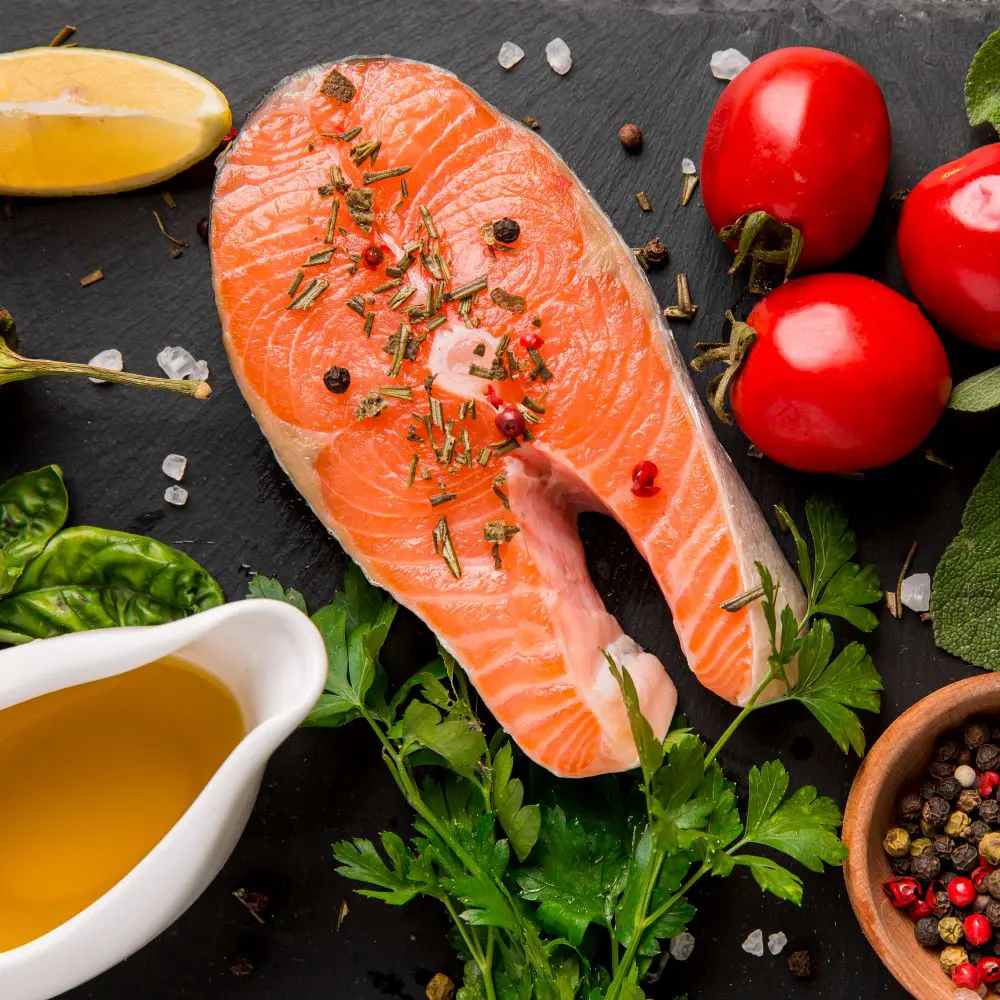Coconut Milk Nutritional And Health Benefits

Coconut milk, a creamy liquid extracted from grated coconut flesh, is a versatile ingredient that has become a staple in various culinary traditions worldwide. Beyond its luscious texture and distinct flavor, coconut milk offers an array of health benefits.
Rich in medium-chain triglycerides (MCTs), coconut milk provides a source of healthy fats that aids weight loss and boosts energy. Let's delve into the world of coconut milk nutrition and uncover its nutritional values.
Nutritional Facts Of Coconut Milk
Coconut milk is highly nutritious, offering a unique blend of health-promoting components. Rich in medium-chain triglycerides (MCTs), it provides a readily available source of energy, aiding in weight management and serving as a quick fuel for the body. The saturated fats in coconut milk, primarily lauric acid, contribute to heart health and may have antimicrobial properties.
The nutritional value of coconut milk per cup (about 240 grams) of serving includes:
- Calories: 552 Kcal
- Water: 162g
- Carbohydrates: 13.3g
- Protein: 5.5g
- Fiber: 5.5g
- Fat: 57g
- Iron: 22% of the DV
- Magnesium: 22% of the DV
- Potassium: 18% of the DV
- Manganese: 110% of the DV
- Selenium: 21% of the DV
- Calcium: 3.8% of the DV
Additionally, coconut milk contains essential vitamins such as C, E, and B-complex, supporting immune function, skin health, and overall well-being. Its nutritional profile also includes antioxidants that combat oxidative stress and inflammation.
1. Rich In Healthy Fat
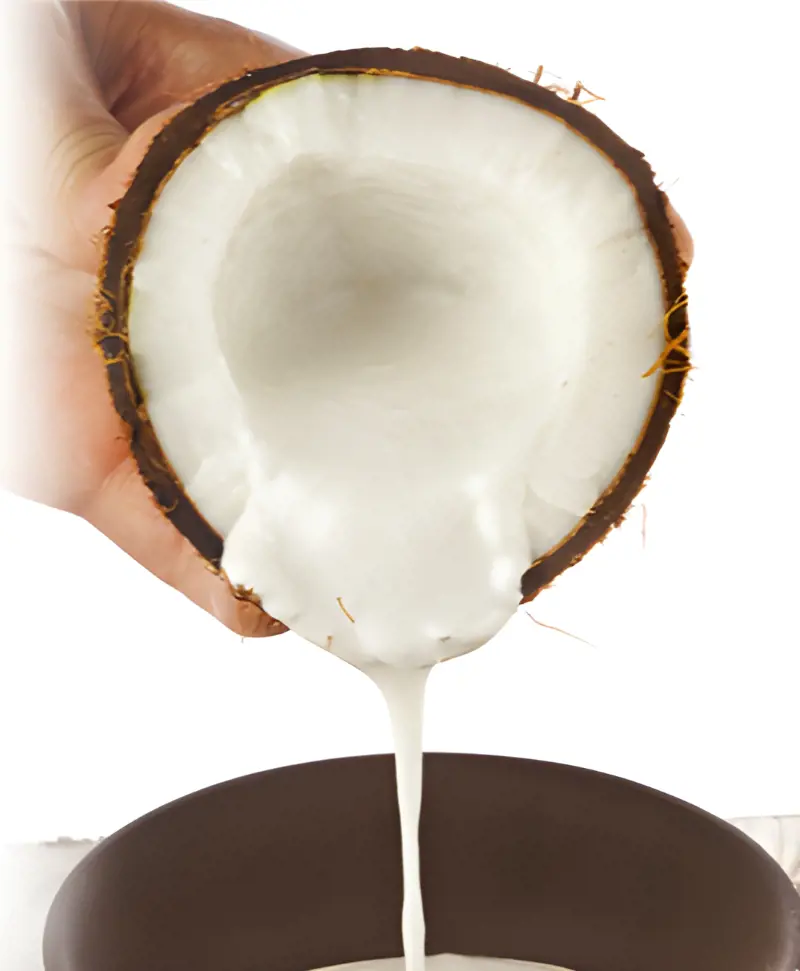
Coconut milk nutrition info stands out as a rich source of healthy fats, making it a valuable addition to a balanced diet. The primary fat in coconut milk is saturated fat, but unlike the saturated fats found in animal products, coconut milk contains a unique composition of medium-chain triglycerides (MCTs). These MCTs are metabolized differently in the body, quickly converted into energy rather than being stored as fat.
Moreover, coconut milk is packed with lauric acid, a fatty acid with antiviral, antibacterial, and anti-inflammatory properties. Additionally, coconut milk boasts monounsaturated and polyunsaturated fats, contributing to a well-rounded lipid profile.
2. Rich Source of Vegan Protein
Coconut milk emerges as a surprising yet potent source of vegan protein, particularly in plant-based diets. While coconut milk is renowned for its creamy texture and distinct flavor, it also offers approximately 2.3 grams of protein per 100 grams. The protein content may vary slightly based on the brand or preparation method.
The protein in coconut milk predominantly comes from the natural proteins present in the coconut itself. These proteins contribute to muscle repair, immune function, and overall cellular health. Additionally, coconut milk's protein content is accompanied by healthy fats, vitamins, and minerals, further enhancing its nutritional value.
3. Loaded With Carbs
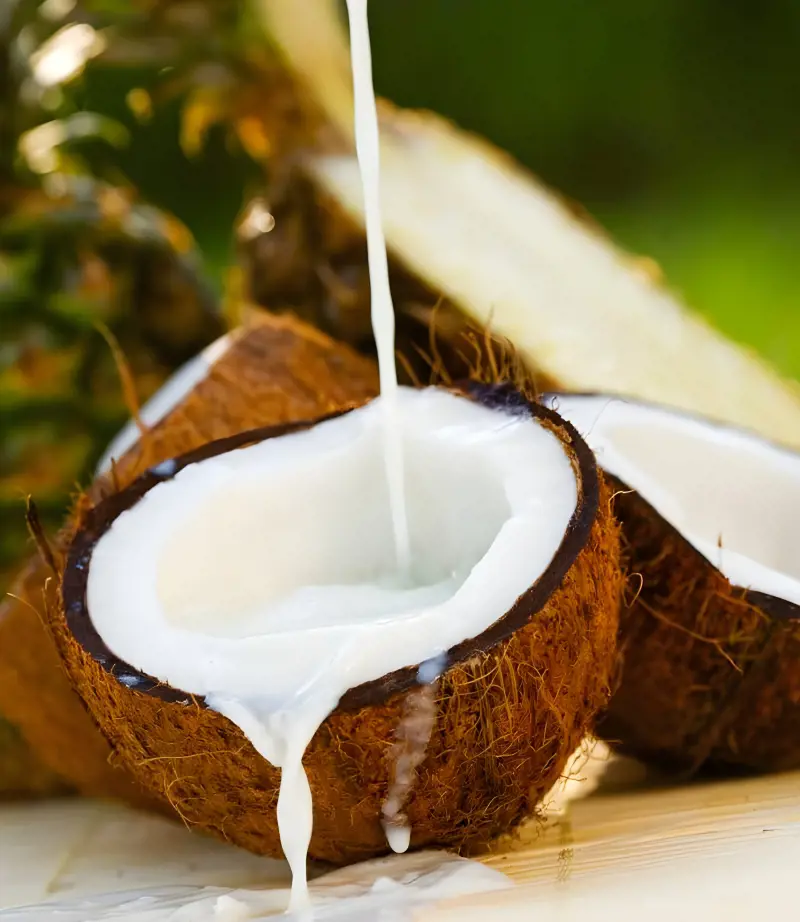
Coconut milk, a popular dairy alternative, is indeed a luscious and creamy addition to many dishes, but it comes with a notable carbohydrate content. In a 100-gram serving of coconut milk, there are approximately 6 grams of carbohydrates. The primary source of these carbs is coconut's natural sugars, including sucrose and glucose, contributing to the milk's mildly sweet taste.
While coconut milk contains fewer carbohydrates compared to other types of milk, it is essential for individuals on ketogenic or low-carb diet to be mindful of their consumption. Despite the carb content, coconut milk offers unique nutritional benefits, including healthy fats known as medium-chain triglycerides (MCTs), which provide a readily available energy source.
4. Boasts Healthy Amount of Manganese
Coconut milk drink nutrition boasts a potent source of manganese, a trace mineral essential for various physiological functions. In every 100 grams of coconut milk, there is approximately 0.9 milligrams of manganese. This mineral plays a crucial role in the formation of connective tissues, bone development, and antioxidant defense.
Regular consumption of coconut milk contributes to maintaining optimal manganese levels, supporting metabolic processes, and promoting overall well-being. Incorporating coconut milk into your diet not only enhances flavor but also ensures a convenient and delicious means of meeting your body's manganese requirements.
5. Phosphorus Rich Food
Coconut milk stands out as a phosphorus-rich food, boasting approximately 100 milligrams of phosphorus per 100 grams. This mineral is vital for various physiological functions, including bone health, DNA synthesis, and energy metabolism. The phosphorus content in coconut milk contributes significantly to maintaining strong bones and teeth, making it an excellent addition to a bone-supportive diet.
Beyond its phosphorus richness, coconut milk offers a host of other nutritional benefits. It contains healthy fats, particularly medium-chain triglycerides (MCTs), which provide a quick and efficient source of energy. Additionally, coconut milk is a dairy-free alternative, suitable for individuals with lactose intolerance or those following a plant-based diet.
6. Boasts High Water Content
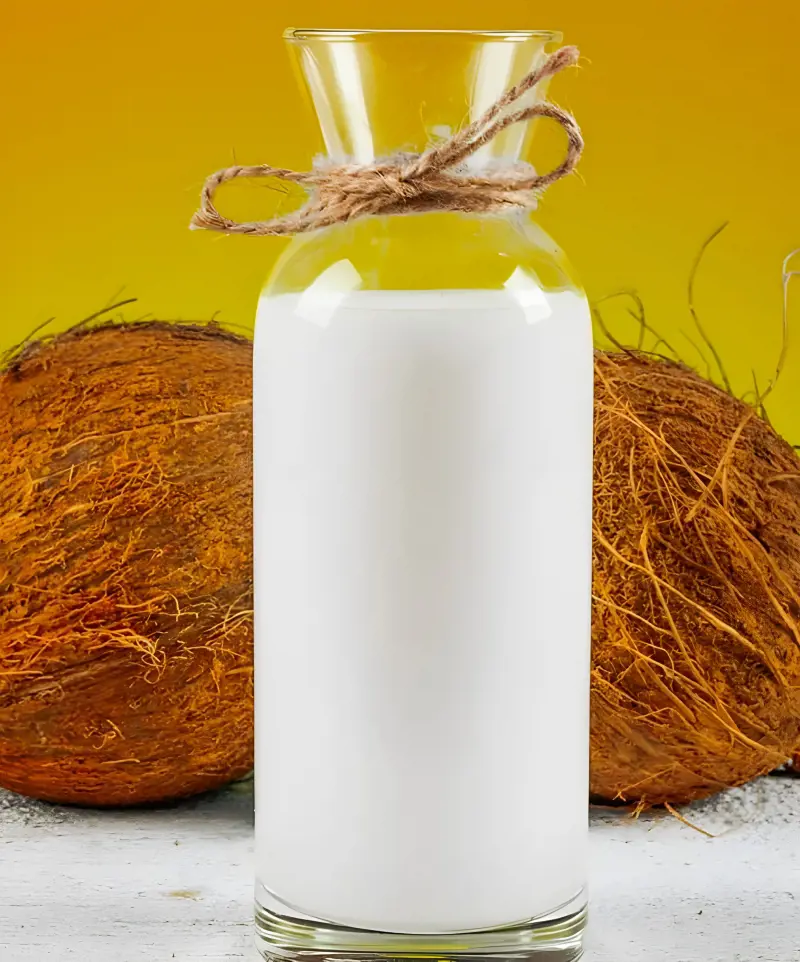
Coconut milk is renowned for its high water content, contributing to its hydrating properties. Comprising approximately 94% water per 100 grams, coconut milk stands out as a refreshing and replenishing liquid. This substantial water content stems from the extraction process, where coconut flesh is blended with water and then strained. The resulting liquid not only provides a tropical flavor but also serves as an excellent source of hydration.
The combination of water and coconut's natural electrolytes, such as potassium and magnesium, enhances its rehydrating abilities. Whether used in cooking or enjoyed as a beverage, coconut milk not only offers a rich, creamy texture but also ensures a significant intake of water.
7. Loaded With Vitamin B1
The richness in Vitamin B1 nutrition in coconut milk, also known as thiamine, contributes significantly to overall health. Thiamine plays a crucial role in energy metabolism, aiding the conversion of carbohydrates into usable energy for the body. In each 100 grams of coconut milk, there is approximately 0.03 milligrams of Vitamin B1. This might seem modest, but when incorporated into a balanced diet, it becomes a noteworthy contribution.
Coconut milk's Vitamin B1 content is essential for maintaining proper nerve function, supporting cardiovascular health, and promoting cognitive well-being. Thiamine deficiency can lead to conditions like beriberi, affecting the nervous system and energy production.
8. Rich Source Of Calcium
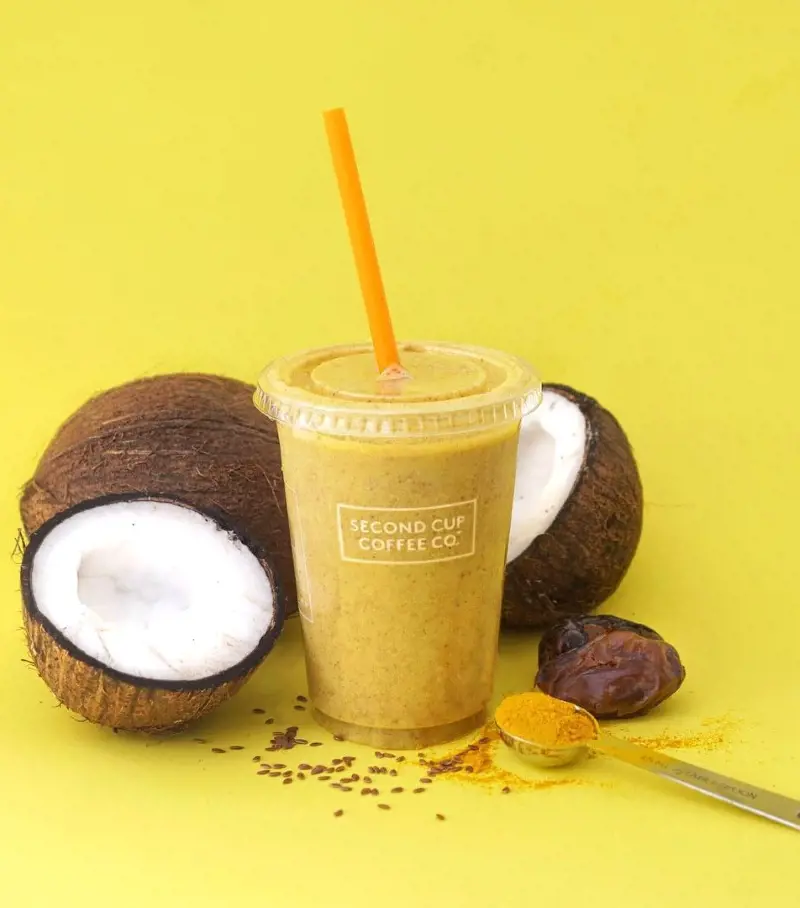
Coconut milk, derived from the flesh of mature coconuts, is a surprisingly rich source of calcium, contributing to bone health and overall well-being. In a 100-gram serving of coconut milk, there is approximately 16 milligrams of calcium. While this amount may seem relatively modest compared to dairy products, it still offers a notable contribution to daily calcium intake.
Calcium is essential for maintaining strong bones and teeth, blood clotting, and muscle function. The absorption of calcium from coconut milk is further enhanced by the presence of vitamin D, often found in fortified versions. Despite being plant-based and lactose-free, coconut milk provides a viable alternative for individuals with lactose intolerance.
9. Incorporates Healthy Magnesium Amount
Coconut, a tropical fruit known for its versatility, contains a noteworthy amount of magnesium, a vital mineral with various health benefits. In every 100 grams of coconut flesh, there is approximately 37 milligrams of magnesium. This mineral plays a crucial role in supporting muscle and nerve function, maintaining a steady heartbeat, and promoting bone health.
Magnesium also contributes to energy production, enzyme activity, and the synthesis of DNA and proteins. Weather consumed in its liquid form or preserved as poweder, coconut's magnesium content aids in preventing magnesium deficiency, which is linked to muscle cramps, fatigue, and abnormal heart rhythms. Additionally, magnesium supports relaxation and can contribute to better sleep quality.
10. Boasts Healthy Amount Of Iron
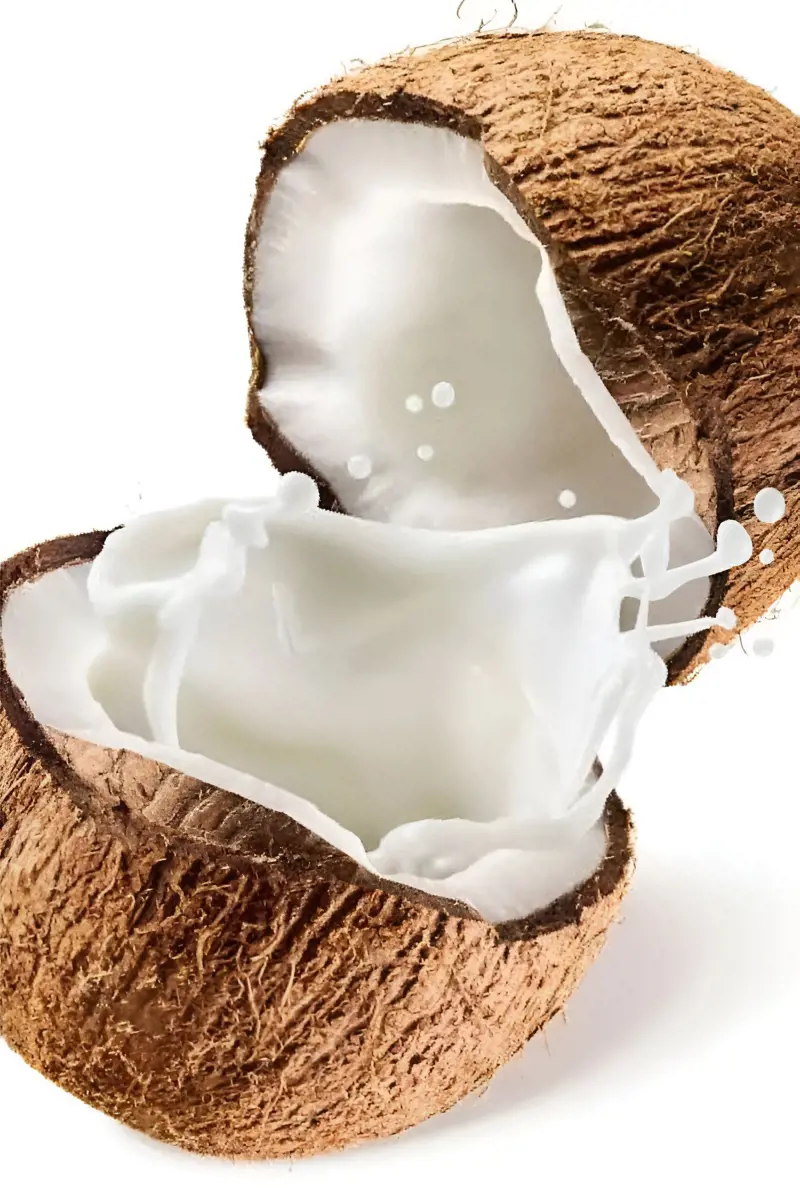
In each 100 grams of raw coconut flesh, there's approximately 1.64 mg of iron, contributing to the recommended daily intake for adults. This essential mineral plays a pivotal role in oxygen transport, supporting the production of hemoglobin and preventing iron-deficiency anemia. Despite not being as iron-dense as certain animal sources, coconut offers a valuable plant-based option for individuals following vegetarian or vegan diets.
Moreover, the iron in coconut is accompanied by other nutrients, such as fiber, manganese, and copper, enhancing overall nutritional value. While coconut might not be a primary source of iron, its inclusion in various dishes can contribute to maintaining healthy iron levels, particularly when part of a balanced and diverse diet.
11. High Potassium Food
Coconut stands out as a high-potassium food, contributing significantly to daily potassium intake. In every 100 grams of raw coconut meat, there is approximately 263 milligrams of potassium. Potassium is a vital mineral that plays a crucial role in maintaining fluid balance, supporting proper muscle contraction, and promoting overall heart health.
The potassium content in coconut aids in regulating blood pressure, reducing the risk of stroke, and supporting optimal kidney function. Including coconut in the diet offers not only the benefits of potassium but also essential electrolytes, making it a hydrating option.
12. Rich In Selenium

While coconut is not particularly rich in selenium compared to some other foods, it does contain a moderate amount of this essential mineral. Selenium plays a crucial role in antioxidant defense, thyroid hormone metabolism, and immune function. In every 100 grams of coconut, there is approximately 6.2 micrograms of selenium. While this amount may seem modest, incorporating coconut into a varied diet can contribute to overall selenium intake.
While seafood and nuts are more potent selenium sources, the inclusion of coconut in one's diet can still contribute to meeting the body's selenium requirements, especially for those with dietary restrictions or preferences.
13. Contains Healthy Amount Of Fiber
Coconut, renowned for its diverse culinary uses and nutritional richness, contains a healthy dose of dietary fiber. In every 100 grams of raw coconut milk, there is approximately 2.2 grams of dietary fiber. This substantial fiber content primarily consists of insoluble fiber, aiding in digestion by promoting regular bowel movements and preventing constipation.
Additionally, coconut contains a significant amount of soluble fiber, which can aid in lowering cholesterol levels by binding to cholesterol in the digestive tract and promoting its excretion. This, in turn, supports heart health and reduces the risk of cardiovascular diseases.
14. Contains Folate
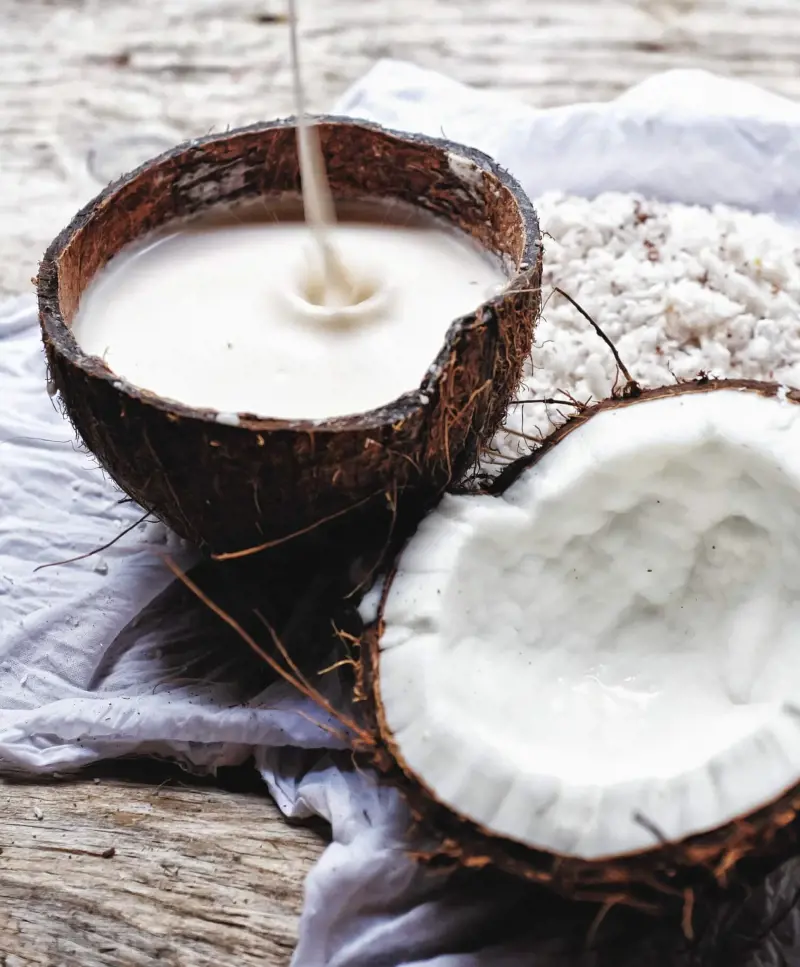
Coconut, a versatile and nutritious fruit, contains a moderate amount of folate, a crucial B-vitamin essential for various bodily functions. In every 100 grams of raw coconut, approximately 16 micrograms of folate can be found. Folate plays a vital role in DNA synthesis and repair, aiding in cell division and promoting the development of red blood cells. This B-vitamin is particularly important during periods of rapid growth, such as pregnancy, as it helps prevent neural tube defects in developing fetuses.
Additionally, folate contributes to the metabolism of amino acids and supports overall nervous system function. Incorporating coconut into a balanced diet alongside other folate-rich foods can help ensure an adequate intake of this vital nutrient.
Recent posts
Nutrition
Nutrition
Licorice Root: Benefits And Uses
You can spell it liquorice or licorice; this herb or root has been in use for centuries in most medicinal applications, as a natural sweetener and to enhance flavors. Regarding its origins, it comes from the root of the "Glycyrrhiza galbre" plant and...
Nutrition
Is Salmon Good For You? Nutritional Facts and Benefits
Salmon fish is a staple diet throughout the world, popular as a super food for its nutrients. Whether savored in sushi, poached, grilled, roasted, or pan-fried, salmon offers minerals and vitamins that contribute to healthy bodily functions. In addit...
Nutrition
25 Smoked Salmon Recipes That You Will Enjoy
Salmon is a silver-colored fish that is loaded with many nutrients, vitamins, and omega-3 fatty acids. Smoked Salmon is better for improving your health and reducing the risk of cancer, heart-related diseases, fights inflammation, reduces anxiety and...
Nutrition
Are Sausages Healthy? Nutrition And Health Benefits
Sausages are tasty in an addictive way, making them one of the most popular foods worldwide. You may have enjoyed this convenient food often, whether on a bun with mustard or grilled on a barbecue, the simple preparation methods are what makes its co...
Nutrition
20 Vegetables That Are Rich In Iron
Iron is essential for our bodies to function well. When we don't get enough iron, we often feel weak and tired. It's important to address iron deficiency early by eating the right foods. Fortunately, many vegetables are rich in iron and can help prev...
Nutrition
15 Cauliflower Nutrition Facts And Health Benefits
Cauliflower, a cruciferous vegetable, resembles a white variation of its relative, broccoli. Like broccoli, it has closely bunched florets attached to a thick core, often surrounded by a few leaves. While white is the most common color, cauliflower i...

